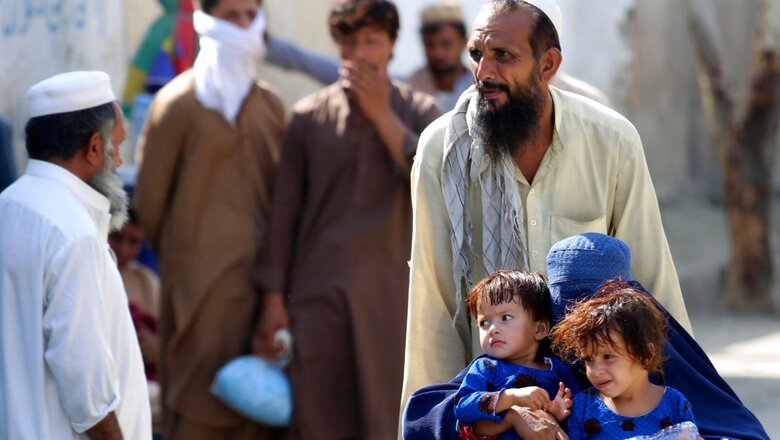
views
A shiver ran up my spine. Hundreds of Afghans huddled in a US Air Force plane. Hordes of desperate men chased the taxiing plane to clamber on. My heart stopped. I saw women with babies, numbed, holding on to sanity. It all happened so fast. They had no time to think. No time to cry.
“Run away.” That’s all a refugee hears when things unfold at this pace. When gun-toting men circle your homes, streets and cities. When they barge into homes, hunting down the men. Or walk into workplaces, telling women to not return. When home is not a haven anymore. When you know what this leads to. What it really means.
I have seen it. I have felt it. I know it.
It’s not a plane that they are clutching at. I see bits of life being held to, as men and women scramble to leave their home and country. No sane person does this. No safe person does this.
Fear hits a refugee like an avalanche. With no warning. In just a day, their world turns upside down. Eyes watch them, their words are weighed, their actions suspect. Fear becomes them.
Srinagar, Kashmir, 1989. I heard a gunshot. The autumn evening was stunned into silence. A policeman had fired at suspected militants. The weapon was aimed in my direction. I ran. I asked a fruit-cart vendor what had happened? He glared at me, saying, you don’t know? A prominent extremist had been arrested. I didn’t know this. Many of us did not know anything. About shifts of power, militants, and of fanatical waves. We were caught unawares. Something ominous was brewing. The fruit-cart vendor’s stance was bold and frightening. It had the cold power of a gun.
The taxi service that I usually hire in England for my airport trips employs drivers from Pakistan; mostly Ahmadiyya, or from Afghanistan; mostly Hazaras. When they speak Urdu, I feel like talking. We are linked by a common thread. Of having fled our homes, of having lived the fear that a minority lives.
When my parents fled Kashmir in 1990, they did not know that they would not return. They became refugees overnight. People we knew, who were suspected of connections with Hindu right-winged organisations or who were in important state jobs began to die. They were shot at. In ones, in twos and sometimes families, like my mother’s cousins in Srinagar. By gun-toting young boys.
The Hazara Afghan taxi driver was my age and had a pleasant manner. He spoke brilliant Urdu and we chatted on my way to Heathrow. He said he was from Bamiyan and asked me if I knew where it was.
I said, “Who does not know Bamiyan?”
“I was young when they blew up the Buddhas. I was teased and tortured in Bamiyan for years,” he smiled. “But I escaped.”
The night of terror is long. The morning of refuge is longer. It hardens you.
Recently our school WhatsApp group shared pictures of a few school friends reuniting after 30 years in Srinagar. A Pandit man, two Muslim men, a Sikh man, and a Muslim woman. I did not recognise the woman sitting at a distance, dressed in black, her face just about visible. I learnt that she was a schoolmate, whom I had not seen for 35 years. I knew her in school as someone bright, modern, talkative and with short, styled hair. Against the beautiful lawns of a Kashmiri garden, pine trees and the Zabarwan mountains, the picture was stark. My male school friends were dressed colourfully, their heads were not covered, and their skin was showing.
Kashmir, in the early 90s, had smoothened the identities of many. Made them colourless.
When news of the Taliban takeover splashed on British TV screens, my wife rang up two of her female Afghan doctor colleagues to ask if their families in Kabul were fine. One of them said they were petrified, hadn’t slept for nights, and didn’t know what would happen next.
I didn’t want to say that I knew.
I remember receiving a letter from my sister, after I had left Kashmir in 1990 and she had not. “Pandit girls and women are being asked by their families to leave.” My sister landed in Delhi within days of the letter. As did many other Pandit girls. Then came the Pandit women. Then came the men and their families. In trucks. In buses. Dishevelled. Disturbed. Disengaged. Many with nothing but their clothes, thinking they would return. They never did. One never does.
The fear, the hurt, the violence lives in a refugee’s memories. As I write, my own fear returns, the danger lurks near me. I feel like a refugee, all over again.
It breaks your heart to see what happens to refugees. How they break into pieces. How their lives are torn to shreds, their identities smashed, as the new cities and countries take over their souls.
Then there are those who cannot flee. Who are preached, prescribed and punished. The picture of my middle-aged female schoolmate, top to toe in black, sitting metres away from her childhood male friends, all dressed in colourful summer clothes, haunts me.
I wonder what it means to be a refugee who cannot flee.
(The views expressed in this article are those of the author and do not represent the stand of this publication.)
Read all the Latest News, Breaking News and Assembly Elections Live Updates here.


















Comments
0 comment